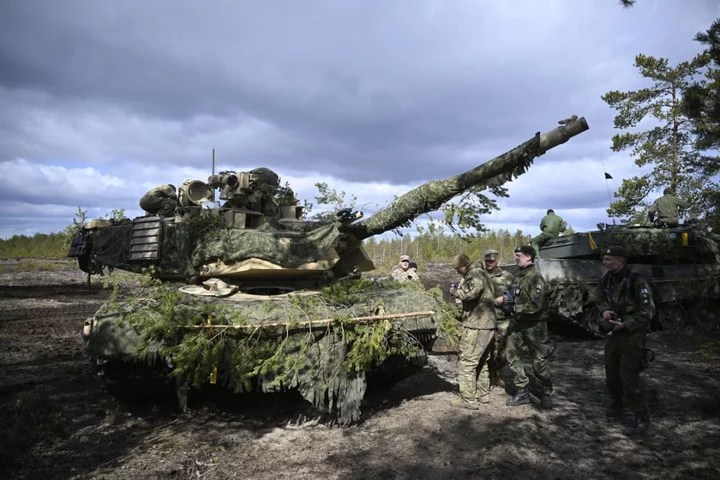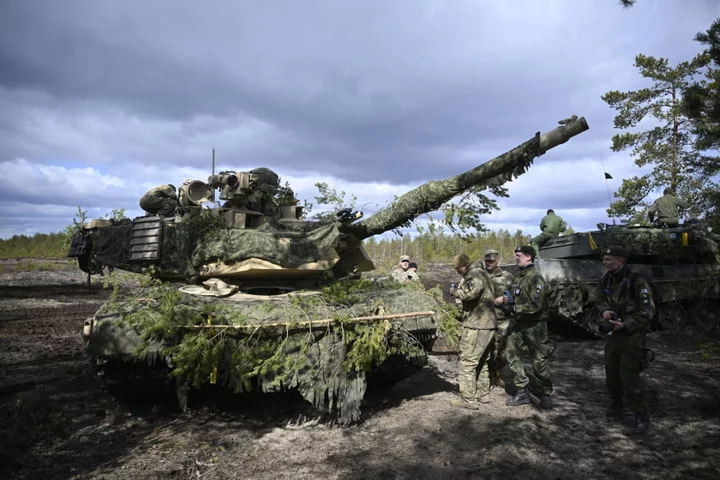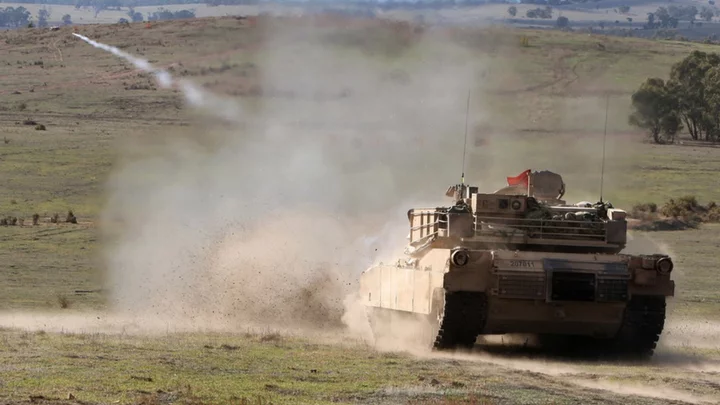
Man arrested for brutal sexual assault and beating of Wisconsin college student pretended he found victim
A suspect accused of brutally raping and beating a University of Wisconsin student reportedly pretended to be an innocent bystander after the vicious attack. Brandon Thompson, 26, is facing charges of sexual assault, reckless injury, and strangulation in connection with the attack that left a young woman in her 20s critically injured, the Madison Police Department said. Madison Police Chief Shon Barnes said that around 3.20am on Sunday, a witness heard a commotion and approached the scene. Mr Thompson was standing next to the victim and reportedly told the witness that he had “just found” her and didn’t know what had happened. While the witness called emergency services, Mr Thompson fled the scene in his vehicle. The victim, a student at the University of Wisconsin-Madison, suffered a broken jaw and other life-threatening injuries. She is in critical condition but is expected to survive. “I think one of the most frightening things [is that it was a random attack],” Chief Barnes said at a press conference on Wednesday. “...This case will not be complete until this cowardly attacker receives the justice he deserves.” Investigators were able to link Mr Thompson to the scene thanks to surveillance video submitted by residents of the area that captured Mr Thompson’s license plate and that he was walking right behind the victim before the attack unfolded. Chief Barnes said that approximately two hours before the attack, Mr Thompson was pulled over by Fitchburg police officers over a registration violation. The neighbouring police department provided bodycam footage from the traffic stop that showed Mr Thompson’s clothing matched what he was wearing during the Madison attack. “As a result of this video, detectives were able to read a license plate that directly led to the identification of Brandon Thompson as the perpetrator of this assault,” Assistant Chief Paige Valenta of the Madison Police Department said. Ms Valenta said that DNA evidence had been collected from the scene and sent to a state crime lab. “Her life is forever changed,” Ms Valenta added. “Her family’s life is forever changed. We will continue to work hard to ensure that Mr Thompson is held fully accountable in a court of law for the heinous act he perpetrated.” The suspect’s attorneys said in a statement to TMJ4 that he is a graduate of the University of Wisconsin at Milwaukee and has a degree in criminal justice and psychology. He reportedly works for a biotech company in Madison. Madison police said Mr Thompson appeared to have no connection with the victim. He was arrested on Wednesday morning and is now awaiting official charges. Read More Famed tech journalist deletes X account with epic rant at Elon Musk and his ‘cesspool’ site The president of a Japanese boy band company resigns and apologizes for late uncle's sex abuse MLB places Dodgers pitcher Julio Urías on administrative leave after arrest
2023-09-07 23:19

Lying down contest enters 20th day as competitors vie for 'laziest citizen' record
Seven competitors lying down on mats are vying for the coveted title of "Laziest Citizen" after smashing the previous record in a satirical contest held annually in a holiday resort in northern Montenegro.
2023-09-07 22:59

What are depleted uranium shells? The controversial armour-piercing muntions being used in Ukraine
The depleted uranium anti-tank rounds soon to be in Ukraine’s military stockpiles have kicked up a debate over its use in the continuing Russian invasion. Announced by the Pentagon in the latest military tranche on Wednesday, the controversial rounds have spread alarm among Vladimir Putin’s ministers who have warned against the escalation yet again. Britain has already promised armour-piercing rounds containing depleted uranium to Ukraine in March. Prime minister Rishi Sunak had backed drawing out the rounds from the UK military’s stockpiles ultimately “to degrade and deter – primarily – Russian aggression”. But what are these depleted uranium munitions? The 120mm anti-tank shells made of depleted uranium are self-sharpening and flammable penetrator in munitions. They are made of naturally occurring Uranium which has been stripped of mostly – not all – of its radioactive matter. So while it is not a nuclear weapon in itself, it acts as a fuel and also as a great explosive that can be used in tank armour, pressed between sheets of steel armour plate. They can be paired with top-tier tanks Western nations have already provided to Ukraine, and are particularly expected to boost the performance of 31 M1A1 Abram tanks set to be sent to the war-hit nation this fall. These rounds first emerged in the 1970s when the US army started making the armour-piercing rounds and has since used it along with tank armour to multiply the firing effect. Incredibly dense, more than lead, depleted uranium is considered a top-tier choice for projectiles. When fired, it becomes “essentially an exotic metal dart fired at an extraordinarily high speed”, RAND senior defence analyst Scott Boston said. “It’s so dense and it’s got so much momentum that it just keeps going through the armour – and it heats it up so much that it catches on fire,” Edward Geist, a nuclear expert at research organisation RAND said. The depleted uranium has also been added to the US ammunition fired by the Air Force’s A-10 close air support attack plane, known as the tank killer. Depleted uranium munitions, as well as depleted uranium-enhanced armour, have been previously used by US tanks in the 1991 Gulf War against Iraq’s T-72 tanks and again in the invasion of Iraq in 2003, as well as in Serbia and in Kosovo. Is the risk alarming? The UN nuclear watchdog has warned of the emissions of low levels of radiation from depleted uranium when handling and also warned of possible dangers of explosion. This is a bug, not a feature of the munition, says Mr Geist. Categorically, depleted uranium is not marked as a nuclear weapon. It is mainly a toxic chemical, as opposed to a radiation hazard. Particles in aerosols can be inhaled or ingested, and while most would be excreted again, some can enter the bloodstream and cause kidney damage. “High concentrations in the kidney can cause damage and, in extreme cases, renal failure,” the International Atomic Energy Agency has said. The US troops have questioned whether some of the ailments they now face were caused by inhaling or being exposed to fragments after a munition was fired or their tanks were struck, damaging uranium-enhanced armour. Experts have said that if the US military could find another material with the same density but without the radioactivity, it would likely switch. The IAEA has warned that handling of depleted uranium “should be kept to a minimum and protective apparel (gloves) should be worn” and “a public information campaign may, therefore, be required to ensure that people avoid handling the projectiles”. Initial signs of radioactivity from the Ukraine war have started trickling in. Russian foreign ministry spokesperson Maria Zakharova had recently claimed that the use of these munitions has already led to radioactive contamination. How has Russia reacted? In March, Russia was fuming after the Rishi Sunak administration announced it will give depleted uranium rounds to Ukraine, prompting them to issue nuclear threats. This time, after the US joined Britain in sending the depleted uranium shells, Moscow snapped and called the latest military aid of depleted uranium a “criminal act” beyond just escalation. “It is a reflection of Washington’s outrageous disregard for the environmental consequences of using this kind of ammunition in a combat zone. This is, in fact, a criminal act, I cannot give any other assessment,” Russian deputy foreign minister Sergei Ryabkov said. He also reiterated previous warnings by Russia about the risk of a nuclear war, because of what he called Western “pressure” on Moscow. “Now this pressure is dangerously balancing on the brink of direct armed conflict between nuclear powers,” he said. In March, Vladimir Putin had warned that Moscow would "respond accordingly, given that the collective West is starting to use weapons with a ‘nuclear component.’” Several days later, Putin said Russia’s response will see Moscow stationing tactical nuclear weapons in neighbouring Belarus, action to which effect was announced in July as Putin and the Belarusian president said they had already shipped some of the weapons. Read More The Body in the Woods | An Independent TV Original Documentary The harrowing discovery at centre of The Independent’s new documentary US sends Ukraine controversial depleted uranium weapons that can pierce tank armour UN nuclear watchdog report seen by AP says Iran slows its enrichment of near-weapons-grade uranium Kyiv drones explode near Moscow and military HQ as Russia on defensive – live
2023-09-07 22:57

Mark Dickey: Rescuers rush to save US man trapped in Turkey cave
Mark Dickey has been stuck in the Morca Cave since Saturday after suffering gastrointestinal bleeding.
2023-09-07 22:53

What are depleted uranium munitions being used in Ukraine and why are they controversial?
The depleted uranium anti-tank rounds soon to be in Ukraine’s military stockpiles have kicked up a debate over its use in the continuing Russian invasion. Announced by the Pentagon in the latest military tranche on Wednesday, the controversial rounds have spread alarm among Vladimir Putin’s ministers who have warned against the escalation yet again. Britain has already promised armour-piercing rounds containing depleted uranium to Ukraine in March. Prime minister Rishi Sunak had backed drawing out the rounds from the UK military’s stockpiles ultimately “to degrade and deter – primarily – Russian aggression”. But what are these depleted uranium munitions? The 120mm anti-tank shells made of depleted uranium are self-sharpening and flammable penetrator in munitions. They are made of naturally occurring Uranium which has been stripped of mostly – not all – of its radioactive matter. So while it is not a nuclear weapon in itself, it acts as a fuel and also as a great explosive that can be used in tank armour, pressed between sheets of steel armour plate. They can be paired with top-tier tanks Western nations have already provided to Ukraine, and are particularly expected to boost the performance of 31 M1A1 Abram tanks set to be sent to the war-hit nation this fall. These rounds first emerged in the 1970s when the US army started making the armour-piercing rounds and has since used it along with tank armour to multiply the firing effect. Incredibly dense, more than lead, depleted uranium is considered a top-tier choice for projectiles. When fired, it becomes “essentially an exotic metal dart fired at an extraordinarily high speed”, RAND senior defence analyst Scott Boston said. “It’s so dense and it’s got so much momentum that it just keeps going through the armour – and it heats it up so much that it catches on fire,” Edward Geist, a nuclear expert at research organisation RAND said. The depleted uranium has also been added to the US ammunition fired by the Air Force’s A-10 close air support attack plane, known as the tank killer. Depleted uranium munitions, as well as depleted uranium-enhanced armour, have been previously used by US tanks in the 1991 Gulf War against Iraq’s T-72 tanks and again in the invasion of Iraq in 2003, as well as in Serbia and in Kosovo. Is the risk alarming? The UN nuclear watchdog has warned of the emissions of low levels of radiation from depleted uranium when handling and also warned of possible dangers of explosion. This is a bug, not a feature of the munition, says Mr Geist. Categorically, depleted uranium is not marked as a nuclear weapon. It is mainly a toxic chemical, as opposed to a radiation hazard. Particles in aerosols can be inhaled or ingested, and while most would be excreted again, some can enter the bloodstream and cause kidney damage. “High concentrations in the kidney can cause damage and, in extreme cases, renal failure,” the International Atomic Energy Agency has said. The US troops have questioned whether some of the ailments they now face were caused by inhaling or being exposed to fragments after a munition was fired or their tanks were struck, damaging uranium-enhanced armour. Experts have said that if the US military could find another material with the same density but without the radioactivity, it would likely switch. The IAEA has warned that handling of depleted uranium “should be kept to a minimum and protective apparel (gloves) should be worn” and “a public information campaign may, therefore, be required to ensure that people avoid handling the projectiles”. Initial signs of radioactivity from the Ukraine war have started trickling in. Russian foreign ministry spokesperson Maria Zakharova had recently claimed that the use of these munitions has already led to radioactive contamination. How has Russia reacted? In March, Russia was fuming after the Rishi Sunak administration announced it will give depleted uranium rounds to Ukraine, prompting them to issue nuclear threats. This time, after the US joined Britain in sending the depleted uranium shells, Moscow snapped and called the latest military aid of depleted uranium a “criminal act” beyond just escalation. “It is a reflection of Washington’s outrageous disregard for the environmental consequences of using this kind of ammunition in a combat zone. This is, in fact, a criminal act, I cannot give any other assessment,” Russian deputy foreign minister Sergei Ryabkov said. He also reiterated previous warnings by Russia about the risk of a nuclear war, because of what he called Western “pressure” on Moscow. “Now this pressure is dangerously balancing on the brink of direct armed conflict between nuclear powers,” he said. In March, Vladimir Putin had warned that Moscow would "respond accordingly, given that the collective West is starting to use weapons with a ‘nuclear component.’” Several days later, Putin said Russia’s response will see Moscow stationing tactical nuclear weapons in neighbouring Belarus, action to which effect was announced in July as Putin and the Belarusian president said they had already shipped some of the weapons. Read More The Body in the Woods | An Independent TV Original Documentary The harrowing discovery at centre of The Independent’s new documentary Ukraine war: What are depleted uranium shells and why are they controversial? US sends Ukraine controversial depleted uranium weapons that can pierce tank armour UN nuclear watchdog report seen by AP says Iran slows its enrichment of near-weapons-grade uranium
2023-09-07 22:52

What women should do if they experience violence online
More than one in 10 women and girls in the UK’s four nations has been a victim of online violence, new research has found. Online violence can includes abuse, unwanted sexual remarks, trolling, threats, and non-consensual sharing of intimate messages and photos. The online YouGov survey, said to be the biggest so far into the issue, found 17% of the women and girls surveyed in Wales and Scotland have experienced online violence, as well as 15% in England and 12% in Northern Ireland. Researchers from the Open University said the findings show the problem is “widespread”. The data came from the 7,500 people aged 16 and over – 4,000 women and girls and 3,5000 men and boys – earlier this year. It also highlighted that online violence was higher among for those aged 16-24 (25%) and for LGBT+ women and girls (35%). The most commonly perceived reasons for why people commit such online violence were the anonymity provided by being online (49%), ease of getting away with it (47%) and misogyny (43%). So what can you do if you’re a victim of online violence? Trolling According to the Crown Prosecution Service, trolling is “a form of baiting online which involves sending abusive and hurtful comments across all social media platforms”. Trolls can be found everywhere on the internet, including forums, blogs, websites and social networks. “Don’t respond,” said Ruth Peters, solicitor and director at criminal defence firm Olliers Solicitors. “Trolls are looking for a reaction. Their aim is to upset and provoke you into making an angry/emotional response. Whilst you can’t prevent a troll from targeting you, you can decide how you choose to react. If you choose not to respond to the abuse, trolls generally give up and go away.” If you are being bullied online or receiving abusive comments, Dr Angela Wilcock, a senior lecturer in criminology at University of Sunderland thinks it’s important to tell a family member or a close friend, so you don’t feel alone and have can their support. The Online Safety Bill (which is expected to be passed at the end of this year) to protect women and girls is key, said Wilcock, “along with education from a young age. Women are continually having to risk assess and protect themselves, but we are not dealing with the perpetrators”. She added: “If women and girls do experience online violence, they must tell someone and seek help immediately from specialist services. To make themselves safer, they can also ensure social media privacy settings are activated.” Don’t forget to record, report and block trolls too. Peters noted. “If someone makes an offensive post, take a screenshot or print the post so that you have proof of it if necessary. “Ask the website moderator, administrator or owner to intervene if the troll doesn’t stop. Most websites/social network platforms have strong anti-abuse policies and, in most cases, trolls are guilty of violating their terms and conditions so will have their accounts terminated. “It’s OK to block those whose behaviour makes you feel uncomfortable and blocking someone on social media is easy.” Threats and abusive communication Set out under the Communications Act 2003 and the Malicious Communications Act 1988, malicious communications can include cyberbullying, harassment online or homophobic, racist, transphobic or misogynistic hate speech. Under section 127 of the Communications Act 2003, it is an offence for someone to send a message that is grossly offensive or indecent, obscene or menacing character. “The message does not need to actually reach the intended victim – the act of sending the message is sufficient,” Peters said. “A ‘message’ will cover all forms of messaging so this can mean a text, email, Facebook message, an internet forum, Snapchat message or picture, etc. Any image or message which has been sent electronically will be covered by this act.” Glitch, a UK charity aiming to end online abuse and championing digital citizenship, with a specific focus on black women and marginalised people, published its 2023 Digital Misogynoir Report in July. The findings “illuminate the ways misogynoir shows up in online spaces; the way it spreads and intersects with other forms of white supremacy; and, most disappointingly, how it is still missed in content moderation by tech platforms”, according to founder and CEO, Seyi Akiwowo, “Tech companies must take responsibility for the ways their ‘build first, think later’ approach actively harms black women – online and offline. “And while the pressure we’ve been applying to the UK government has resulted in the welcome and necessary addition of women and girls to the Online Safety Bill, the government has a responsibility to hold tech companies to consistent account for the violence their platforms enable.” Non-consensual sharing of intimate photos and messages In April 2015, the Criminal Justice and Courts Act (CJCA) 2015 made ‘revenge porn’ a specific offence, and it became a crime to “disclose private sexual photographs and films; without the permission of the individual who appears in the photograph or film; with intent to cause distress”, Peters said. “[But] stronger regulation is also proposed surrounding the sharing of sexual images without consent.” The Online Safety Bill, currently progressing through the House of Lords, seeks to specifially criminalise similar offences to revenge porn. “These include sharing ‘deepfakes’ (explicit images which have been altered to look like someone) without consent,” Peters said. “Stronger regulation is also proposed surrounding the sharing of sexual images without consent. The current law requires intention to cause distress in order to be found guilty of this offence, [but] the proposed changes will amend this in order to prosecute more people.” She added: “There will be a ‘base offence’ for sharing intimate images without consent. There will be two more serious offences created if images are shared to cause humiliation, alarm or distress, or for sexual gratification.” But for Wilcock, “women shouldn’t have to ensure our profiles are closed off to the world just so that we don’t endure abuse from trolls and abusers. “It shouldn’t be this way, but that is the sad reality of today’s online world. Until we do more to hold perpetrators to account and deal with them appropriately, it is hard to see how it will get better for victims.” Read More Charity boss speaks out over ‘traumatic’ encounter with royal aide Ukraine war’s heaviest fight rages in east - follow live Athlete who ran over 200km through the desert shares advice for running in a heatwave Women being invited to help shape the future of reproductive healthcare – from period pain to menopause How to style your home like a professional
2023-09-07 22:29

Suspected Chinese operatives using AI generated images to spread disinformation among US voters, Microsoft says
Suspected Chinese operatives have used images made by artificial intelligence to mimic American voters online in an attempt to spread disinformation and provoke discussion on divisive political issues as the 2024 US election approaches, Microsoft analysts warned Thursday.
2023-09-07 22:21

Afghan interpreter's tears of joy over son's visa decision
The move means Sajid, who worked for the UK armed forces, can be reunited with his three-year-old.
2023-09-07 22:16

Depleted uranium shells: Why are they used and are they dangerous?
The US is sending depleted uranium shells to Ukraine, to be used with tanks it is also supplying.
2023-09-07 21:53

Outrage over Abbas's antisemitic speech on Jews and Holocaust
German and Israeli officials condemn the Palestinian leader's remarks about the mass murder of Jews.
2023-09-07 21:29

China may be behind social media accounts seeking to sway US voters, Microsoft says
Microsoft researchers said on Thursday they found what they believe is a network of fake, Chinese-controlled social media
2023-09-07 21:23

Lainey Wilson leads the 2023 Country Music Award nominations for the second year in a row
Lainey Wilson leads the 2023 Country Music Association Awards nominations for a second year in a row
2023-09-07 20:59
